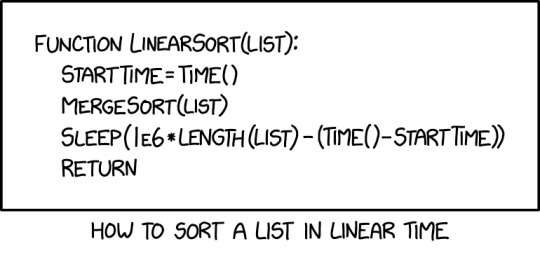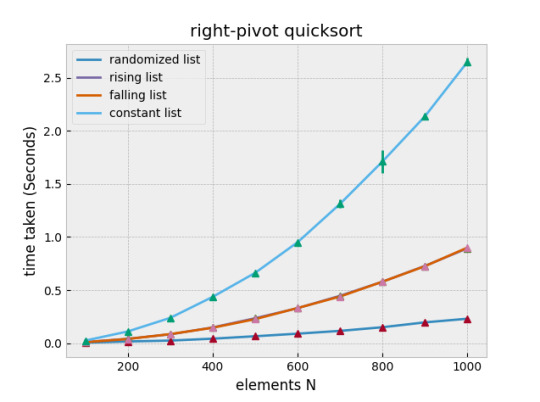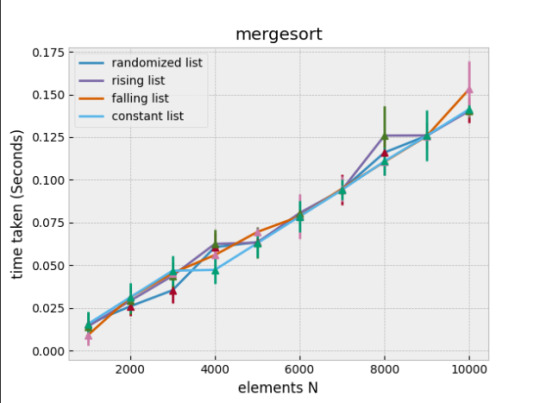#mergesort
Explore tagged Tumblr posts
Text
Exploring Quantum Leap Sort: A Conceptual Dive into Probabilistic Sorting Created Using AI
In the vast realm of sorting algorithms, where QuickSort, MergeSort, and HeapSort reign supreme, introducing a completely new approach is no small feat. Today, we’ll delve into a purely theoretical concept—Quantum Leap Sort—an imaginative algorithm created using AI that draws inspiration from quantum mechanics and probabilistic computing. While not practical for real-world use, this novel…
#AI#algorithm#amazon#chatgpt#coding#computer science#css#data-structures#DSA#engineering#google#heapsort#insertionsort#javascript#mergesort#new#programming#python#quicksort#radixsort#sorting#tech#tesla#trending#wipro
2 notes
·
View notes
Text

Merge Sort . . . Explore this essential Data structure and Algorithm! It covers key topics and resources for every tech enthusiast from algorithms to Data Structure. Perfect for learning and growth. Let's connect and innovate together! Check the link below: https://bit.ly/4fA9flA
1 note
·
View note
Text

The best case is O(n), and the worst case is that someone checks why.
Linear Sort [Explained]
Transcript Under the Cut
[The panel shows five lines of code:] function LinearSort(list): StartTime=Time() MergeSort(list) Sleep(1e6*length(list)-(Time()-StartTime)) return
[Caption below the panel:] How to sort a list in linear time
2K notes
·
View notes
Text
Easier to sort than looking up every title individually.
i DESPERATELY want an elo-type ranker that will let me sort my tbr by the books i'm most interested in reading, PREFERABLY a calibre plugin that will let me choose by clicking on covers because that's the place that has most of my books with covers. i tried just using a site that let me copy/paste a list but without the covers i had to look up every title to figure out what the fuck i was choosing between :(
#Also if you have like. Library-duty shelving#and can just shelve the ones already sorta-sorted#i tend to use MergeSort for physical books#Quicksort is faster if I’m dragging digital icons around tho#Books
130 notes
·
View notes
Text

Made this little Gyomei phone bg💖
Btw I don’t think I can do lunar new year nor valentine specials, there’s too much college hw 😭
.
I’ve got big c recursive hw due tmr, a tkinter ui (tweak according to prof’s new req) and data algo due Monday
I still don’t understand mergesort and binary search, i mean i could probably code it in python but prof use c++ so maybe I’m just unfamiliar with the language
Now that I have him as my phone lockscreen
I felt a little more motivated!
Also feel like I’m going deaf in my right ear, it’s probably by lack of sleep
#gyomei#kny gyomei#demon slayer gyomei#gyomei himejima#kimetsu gyomei#demon slayer#kny#kny fanart#kimetsu no yaiba#demonslayer fanart#anime#fanart#anime fanart#himejima gyomei#kimetsu fanart#fanart artist#phone wallpaper#chibi art#chibi#chibi gyomei#happy
58 notes
·
View notes
Text
perpetually frustrated by things that have theoretically better runtime but aren't practical to do as a human. like mergesort or newton-raphson division
22 notes
·
View notes
Text
super cool in-progress programming language: DCS, a functional programming language with a totality checker but not dependent types (unlike the proof assistants that usually have totality checkers). the idea is to allow divergence via a Div effect monad (cf Haskell's IO) while having the bulk of the language guaranteed to terminate. one of the big selling points is that the totality checker works for divide-and-conquer strategies, which Coq etc generally don't.
it can do this because it's based on some very complex type-level machinery where recursive functions are actually (i hope i'm using these words correctly) Mendler-inductive functor algebras. totality checkers require that arguments to recursive calls be smaller than the original argument, but normally enforce that purely based on the syntax of constructors which means they can't go through the function calls required for divide and conquer splits. here, the idea is whenever there would be recursion, it instead uses an opaque type variable and an extra function parameter to enforce that the call can only be to something "recursable", and takes a fixed point so that it ends up back at the original recursive type. (i might try and write more about these if anyone is interested, or to figure out if i actually understand it or if i'm just nodding my head along.)
i don't know if it's possible to pour enough syntactic sugar onto that concept to make it actually usable as a language. but the examples of programs in the language are way more readable than the version displayed in the paper, so it honestly might be. the list file in the stdlib has both quicksort and mergesort, and if you look past the silly decision to use greek letters instead of keywords and the limited pattern-matching it doesn't look that far off a normal recursive function.
my biggest question, though, is how it's possible to take a fixed point of the algebra without risking nontermination. if your totality checker isn't total what's the point?!
40 notes
·
View notes
Note
yer a good sort, chara. ain't done nothin wrong. (a mergesort, maybe, or a heapsort. maybe a blocksort.)
* ...
7 notes
·
View notes
Text
Software Technical Interview Review List
Data Structures
Arrays (and Java List vs ArrayList)
String
Stack
Queue
LinkedList
Algorithms
Sorting (Bubblesort, Mergesort, Quicksort)
Recursion & Backtracking
Linear and Binary Search
String/Array algos
Tree traversal
Dynamic Programming
Graph algos (DFS, BFS, Dijksta's and Kruskals)
OOP fundamentals
Polymorphism
Inheritance
Encapsulation
Data abstraction
SOLID and GRASP
Explanations & example questions:
Strings and Arrays [ 1 | 2 | 3 | 4 | 5 | 6 | 7 | 8 ]
Stacks and Queues [ 1 | 2 ]
LinkedList [ 1 | 2 ]
Sorting & searching [ 1 | 2 | 3 | 4 | 5 | 6 | 7 ]
Recursion and Backtracking [ 1 | 2 | 3 | 4 ]
Dynamic Programming [ 1 | 2 | 3 | 4]
Graphs [ 1 | 2 | 3 ]
Tree [ 1 | 2 ]
General DS&A info and questions [ 1 | 2 | 3 | 4 | 5 ]
OOP review & questions [ 1 | 2 | 3 ]
#ive been procrastinating this coding assessment for my interview so bad 😭😭#im just scared of messing up cause i need this internship#But its due soon so im really buckling down now >:)#object oriented programming#algorithms#data structures#software engineering#ref#resource#mypost
20 notes
·
View notes
Text
Do any of my programming mutuals happen to know of any sorting algorithms designed specifically for purely functional languages? I know GHC uses a modified version of mergesort given that it's recursive anyway so it fits nicely into Haskell, but but I've been wondering if there are any algorithms that aren't just adapting imperative versions.
32 notes
·
View notes
Note
Making you choose again:
Quicksort or Mergesort
YOU
Y O U
I choose quicksort, it's just neater
(my favourite is bogosort tho)
7 notes
·
View notes
Text
implementing sorting algorithms in python
After way too much time, I finally managed to get my quicksort variant functions up and running.... finally.



we can easily say that median of three quicksort slays the hardest.
it's a shame that none of them compare to mergesort:

look at that!!! worst case scenario? I hardly know her. Mergesort is stable regardless of what you throw at it, and all while delivering it at O(n log(n)) time complexity!!
6 notes
·
View notes
Text

Counting Sort . . . Explore this essential Data structure and Algorithm! It covers key topics and resources for every tech enthusiast from algorithms to Data Structure. Perfect for learning and growth. Let's connect and innovate together! Check the link below: https://bit.ly/3Wvp0kQ
0 notes
Text
Nearly All Binary Searches and Mergesorts Are Broken
https://research.google/blog/extra-extra-read-all-about-it-nearly-all-binary-searches-and-mergesorts-are-broken/
0 notes
Text
Learn Data Structures and Algorithms
Mastering data structures and algorithms (DSA) is one of the most effective ways to boost your coding skills and become a better programmer. Whether you're just starting out or have some experience, learning data structures and algorithms is essential for solving complex problems efficiently. By understanding how data is stored and manipulated, and by knowing the right algorithms to use, you'll write more efficient, optimized, and scalable code.

When you learn data structures and algorithms, you're not just memorizing concepts—you're developing a deeper understanding of how to approach problem-solving. For example, by mastering algorithms like QuickSort or MergeSort, you can handle large datasets with ease. Similarly, understanding data structures like arrays, stacks, and trees will allow you to choose the most appropriate structure for your problem, ensuring that your solution is both fast and memory-efficient.
0 notes
Text
How does DSA optimize data analytics pipelines?
Data Structures and Algorithms (DSA) play a crucial role in optimizing data analytics pipelines by enhancing efficiency, scalability, and reliability. In data analytics, vast amounts of data are processed, transformed, and analyzed. Efficient algorithms ensure that these operations are completed quickly and with minimal resource usage.
For instance, sorting algorithms like QuickSort or MergeSort can organize datasets faster for further analysis. Similarly, hash tables and trees, such as B-trees or Trie structures, enable efficient storage and retrieval of data, reducing lookup times during query execution. Graph algorithms are indispensable for analyzing relationships in network data, such as social media or logistics.
Dynamic programming and greedy algorithms help optimize tasks like scheduling or resource allocation in real-time analytics. Additionally, memory-efficient data structures like linked lists or queues allow seamless handling of streaming data, which is crucial for applications like stock market analysis or IoT-based systems.
By integrating DSA principles, data analysts and engineers can design pipelines that scale effectively as data volume grows, ensuring robust and quick insights. Learning DSA not only aids in problem-solving but also strengthens your ability to implement advanced analytics solutions. To master these skills, consider enrolling in a data analytics certification course to boost your expertise.
0 notes